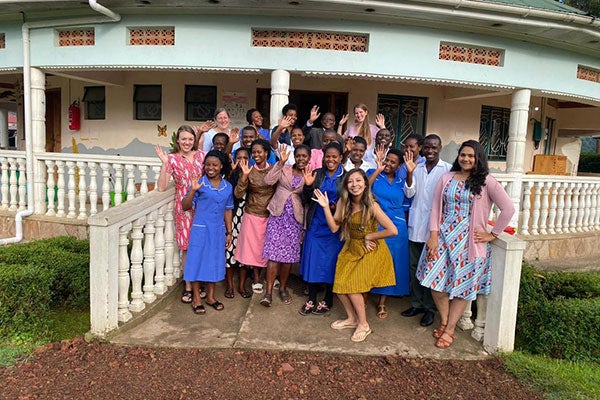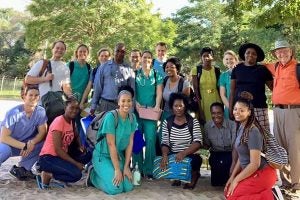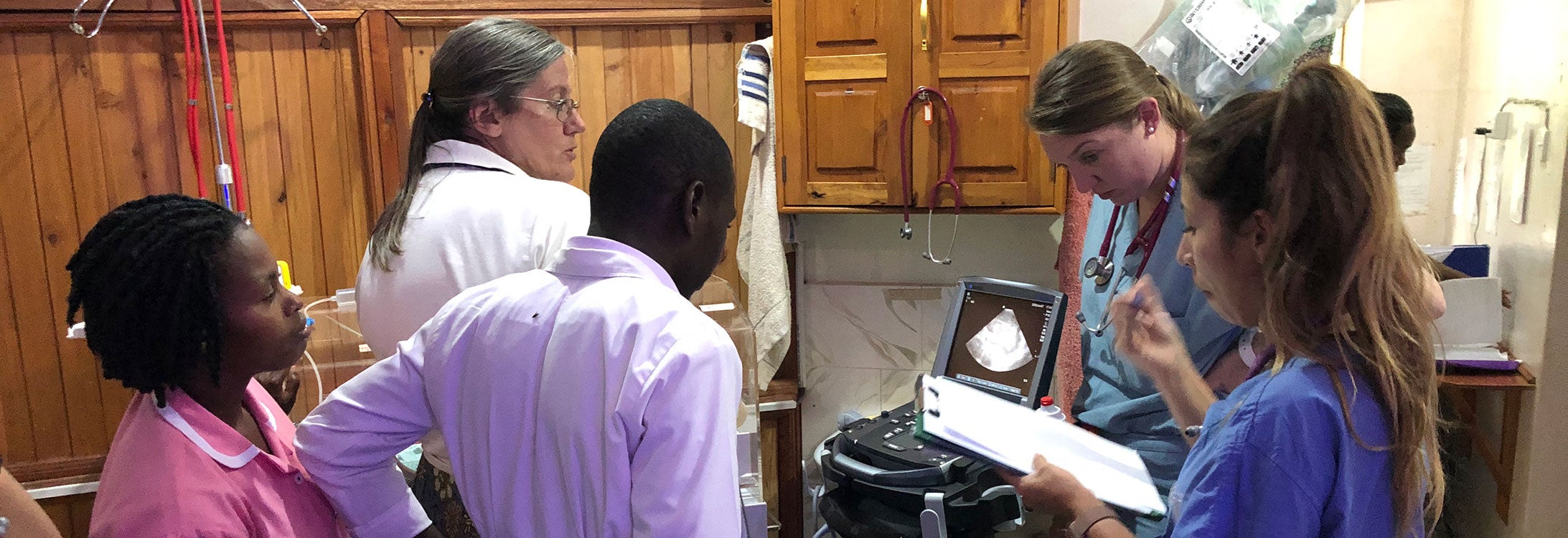Rotations
Overview

The Global Health and Underserved Populations is here to help you plan your next international rotation. We will be working with GME and the teaching departments to facilitate the process and hope to create a universal guide for resident rotations. Please continue to check our website for updates.
Please see below for a list of current opportunities available through ECU faculty. We will soon be adding a list of international experiences recommended by current and past residents. If you have recently returned from an international experience and would like to share, please contact us.
International Opportunities at ECU-ECU Health
Programs can accommodate a limited number of residents and are often filled more than a year ahead of time. Please apply early!
2021-2022 GME TRAVEL UPDATE: Resident and fellow academic travel will only be approved for countries with Level 1 and Level 2 travel advisory designations. Please visit https://travel.state.gov/content/travel/en/traveladvisories/traveladvisories.html to determine if your site meets this requirement or not. Continue to check back here for ECU/Vidant GME travel updates.
Guatemala
ECU School of Nursing: Perspectives in International Community Health Nursing.
3 week course which includes Spanish language instruction and cultural immersion as well as experience in community health development. Students live with Guatemalan families in rural villages and participate in family and community activities, such as first communion, birthday celebrations, and national holidays. Each day, students travel by local camioneta (old school bus) into the beautiful city of Antigua where they take Spanish language lessons. In the afternoons, students take part in or conduct various community health education programs. And at the end of each day, students go home to their host family to discuss their work, eat supper, and help their family with household chores. Course is designed for nursing students but is open to health students in other disciplines, including medical students and residents.
Contact: Dr. Kim Larson
Haiti
The Tovar Medical Clinic was opened in 1985 by a group from the United States. It serves a rural population of about 60,000 people in the region of Grison Garde 25 miles south of the city of Cap Haitien. All volunteer medical teams travel from the U.S. to the clinic four times a year. The team consists of 2 residents, 3 pediatricians, and 3 adult physicians who provide the only medical care the residents of Grison Garde receive. Between team trips, the clinic is staffed by a Haitian physician and nurses ensuring ongoing medical care.
Contact: Dr. Matthew Ledoux
The Haiti Mission
Uganda
Residents are invited to travel to Kisoro, Uganda, home of the Silver Back Mountain Gorillas, for a two-week long rotation each January to care for orphaned infants and children at the Potter’s Village (PV). PV is a missionary founded non-government organization (NGO) that serves the children and families of Kisoro district affected by loss of a parent. They have a medical center which serves about 15-20 out patient pediatric patients per day, as well as a 20 bed inpatient unit, 10 bed special care nursery, 10 bed Nutritional Rehab unit, and a 7 bed overflow unit. Residents will be expected to see out patients, round on inpatients, learn about nutritional rehabilitation of children affected by kwashiorkor and marasmus, and cover the night call. Common illnesses seen are: Malaria, Typhoid, Burns, Dysentery, TB, sepsis and malnutrition among others. There will be an optional travel experience at the end of the trip, and also on your free days you may visit local attractions such as mountain gorilla trekking, climbing volcanoes, or visiting lake Mutanda.
Approximate cost: $2800
Additional expenses (safari, gorilla trekking, souvenirs): Approximately $1300
For more information about PV please visit the Potters Village problems.
If you are interested in the trip, please contact Heidi Kenefick at hbkenefick@gmail.com to have your name put on a list and for more information.

Zambia

Since 2007, Dr. Tom Irons organized a three-week trip every February to serve a population of about 750 children in and around a village in Western Zambia. A group of four medical students and four residents accompany on this rotation in serving at an outpatient clinic and a mission hospital. The goal is to teach how to adapt to a new culture and to engage community leaders on the ground to improve community health together. In 2024, Dr. Heidi Kenefick became the contact for the Zambia rotation.
If you are interested in the trip, please contact Dr. Heidi Kenefick via hbkenefick@gmail.com to have your name put on a list and for more information.
Planning Your Rotation
Step-By-Step Guide to International Rotations for Residents
- Decide where you are interested in going. Typically this should be decided about one year in advance of your trip.
- If you don’t see a trip listed below, you can also set up your own away elective. To do so, you will need to have a supervising doctor where you are going agree to host you. You will also need a doctor here at ECU agree to endorse the trip. You will need a letter from both doctors for GME approval.
- Once you have decided, contact that appropriate person in charge of that trip. Currently ECU has the following trips available:
- Guatemala: ECU School of Nursing: Perspectives in International Community Health Nursing – Contact Dr. Kim Larson
- Haiti: The Haiti Mission – Contact Dr. Matthew Ledoux
- Uganda: Contact Heidi Kenefick
- Zambia: Contact Dr. Tom Irons
- Get approval from your program director to do an away elective.
- You must have your program director fill out the away request form from the GME office. This form will require you to write out learning objectives for your trip. Some of the people in charge of the rotation may already have them typed up, but if not you will have to type them up yourself. In general they want to know what you will learn, why you can’t learn it at Vidant, how long the rotation is, and a description of where you are going and what you will be doing. This is due 3 months prior to departure.
- You will need a letter from the person in charge of the trip stating that you are going on the trip. You need this for GME approval, and in most cases it will be taken care of by your program coordinator.
After you have both the approval of your program director, GME and the person going on the trip, you will need to start making travel arrangements - If you are traveling with a group, purchase your airline tickets as a group.
- You must buy trip insurance, which includes medical evacuation. If you are going to a politically unstable country, you may also wish to purchase emergency evacuations of causes other than medical as well.
- Get your passport. Recommend at least 6 months in advance, but you can get an expedited passport within two weeks of travel if you forget, for an extra fee.
Some countries will require that you get a visa in advance, others you can buy the visa in the airport. Check out the state departments website for the country you are going to. - Make an appointment with a local travel clinic. You may need vaccines, malaria prophylaxis, etc. This should be done at least one month prior to departure. Do not go to your regular doctor as they often are not well versed in what you need to travel. If going to Africa (and parts of Asia) you will need proof of yellow fever vaccination (which is it’s own special document).
Travel clinic and immunizations
The ECU International Travel Clinic is located at the ECU Adult Specialty Care Clinic at 2390 Hemby Lane, Greenville, NC 27834. Appointments currently are only available by request for ECU sponsored trips. Please contact Dr. Emberger for more information.
Safety
- Smart Traveler Enrollment Program (STEP) Embassy Registration and country-specific security alerts
- Country specific travel safety information
Travel insurance
Faculty/Physicians participating in credit-bearing overseas studies are required by North Carolina law to purchase the HTH Preferred Health Overseas medical insurance policy. This policy also covers emergency evacuation if needed. The cost varies annually but is very affordable. An International Affairs representative is available in Brody Student Affairs’ office the first and third Wednesday of every month from 1:00 – 3:00 p.m. for purchasing this insurance and other international questions.
